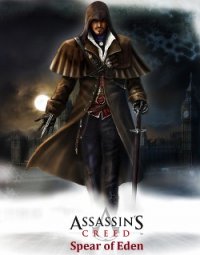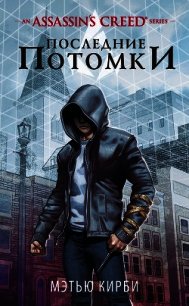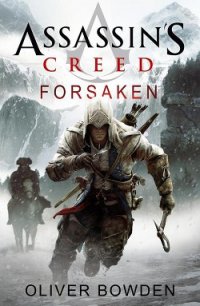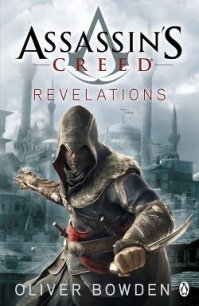Assassin's creed : Black flag - Bowden Oliver (библиотека книг .txt) 📗
What on earth were they cooking up?
“Tosh. I’ve seen a score of ladies who can reef a sail and spin a capstan.”
“Would you teach me to fight? With a cutlass, like? And how maybe to handle a pistol?”
“All that and more. But you have to want it and work for it. There’s no stumbling into true success.”
Now Calico Jack confirmed what I thought. His disembodied voice seemed to echo off the stone. “Oi, lad, that’s my lass yer making love to. Lay off or I’ll cut ya.”
“Up your arse, Rackham. ‘Lad’ is the last thing you should be calling me . . .”
Oh yes? I thought. Was James Kidd about to reveal her disguise?
James was reaching beneath his/her shirt. Calico Jack was blustering, “Oh, is that right . . . Lad?”
Roberts removed the cube from the Observatory controls and the image evaporated.
I bit my lip and thought of the Jackdaw. Ade didn’t like our current situation. He was dying to make sail.
But he wouldn’t do it without me.
Would he?
Now the glow that hung in the chamber before us became something else again, and all thoughts of the Jackdaw’s intentions were forgotten, as Roberts said, “Let’s try another. Governor Woodes Rogers,” and placed another crystal cube into the console and new images formed.
We were seeing through the eyes of Woodes Rogers. Standing with him was Torres and not far away was El Tiburon. Suddenly the vision was filled with the image of a blood vial being held up for examination by Rogers.
He was speaking. “You have a bold idea. But I must think it through carefully.”
The Observatory chamber room filled with the sound of Torres’s reply.
“A simple pledge of loyalty is all you need suggest to the House of Commons. An oath, a gesture, and a simple ceremonial dram of blood taken from the finger. That’s all.”
Christ. Whatever Anne and Mary had been cooking up, it was nothing compared to this lot. Still trying to control the bleeding world—bleeding being the operative word. And doing it how? The English Parliament.
Now Rogers was speaking. “The ministers may give me trouble, but it should be easy enough to convince the House of Lords. They do adore an excess of pomp and circumstance.”
“Exactly. Tell them it’s a show of fealty to the king . . . Against those revolting Jacobites.”
“Yes, indeed,” replied Rogers.
“The crucial detail is the blood. You must get a sample from each man. We want to be ready when we find The Observatory.”
“Agreed.”
Roberts removed the cube from the console and looked at me, triumph in his eyes. Now we knew what the Templars were plotting. Not only that, but we were one step ahead of them.
The images had gone, the strange glow had returned to the walls and I was left wondering if I’d imagined the whole thing. Meantime, Roberts pulled something from the console and held it aloft. A skull. The skull in which he’d placed the vials of blood.
“A precious tool, you see?”
“Sorcery, that’s what it is,” I said.
“Not so. Every mechanism that gives this device its light is a true and physical thing. Ancient, yes, but nothing supernatural or strange.”
I looked doubtfully at him, thinking, You’re kidding yourself, mate. But decided not to pursue it.
“We’ll be masters of the ocean with that,” I said. Wanting to hold the skull, reaching out to take it from him, overcome with the desire to feel the weight of it in my palm. I felt a tremble as he came forward with it, his hand outstretched. And then, instead of giving it to me, he whipped it around and struck me in the face with it, knocking me across the floor of The Observatory, then over the precipice of the pit.
I fell, slamming into the stone on the way down, whipped by the vegetation that clung to the rock face but unable to get a grip on it and stop my fall. I felt a searing pain in my side, then smacked into the water below, thanking God I had the presence of mind to turn my fall into the semblance of a dive. From that height, that instinct might have saved my life.
Even so, my entrance into the water was a messy one. I crashed into it and floundered, swallowing water, trying not to let the pain in my side drag me under. As I broke the surface and gasped for breath I looked up, only to see Roberts gazing down upon me.
“There’s nothing in my code about loyalty, young man.” He taunted me, his voice echoing in the distance between us. “You played your role, but our partnership is done.”
“You’re a dead man, Roberts,” I roared back, only I couldn’t quite manage a roar. My voice was weak and, anyway, he’d left, and I was too busy trying to tend to the flaming pain in my side and pull myself to safety.
When I pulled myself to the side what I found was a branch sticking from my side, the wound colouring my robes red. I yanked it out with a scream, tossed the stick away and clenched my teeth as I held the wound, feeling blood seep through my fingers. Roberts, you bastard. You bastard.
With the wound still held closed, I climbed back to The Observatory, then limped out and back down to the beach, pain-sweat pouring off me. But as I stumbled out of the long grass and onto the beach what I saw filled me with anguish. The Jackdaw, my beloved Jackdaw, had left. There was just the Rover anchored off shore.
There, where the beach met the sea, was moored a yawl, the coxswain and rowers silent sentinels with the sea at their backs as they awaited their captain—Captain Bartholomew Roberts, who stood before me at the entrance to the beach.
He crouched. His eyes flashed and he smiled that peculiar joyless smile of his. “Oh . . . your Jackdaw has flown, Edward, eh? That’s the beauty of a democracy . . . The many outvote the one. Aye, you could sail with me, but with a temper as hot as yours I fear you’d burn us all to cinders. Luckily I know the King’s bounty on your head is a large one and I intend to collect.”
The pain was too much. I could hold it together no more and felt myself passing out. The last thing I heard as the darkness claimed me was Bartholomew Roberts, softly taunting me.
“Have you ever seen the inside of a Jamaican prison, boy? Have you?”
PART IV
FIFTY-SEVEN
A lot can happen in six months. But in the six months to November 1720, it happened to other people. Me, I was mouldering in jail in Kingston. While Bartholomew Roberts became the most feared pirate of the Caribbean, commanding a squadron of four vessels, his flagship The Royal Fortune at its head, I was trying and failing to sleep on a roll on the floor of a cell so cramped I couldn’t lie straight. I was picking maggots from my food and holding my nose to get it down. I was drinking dirty water and praying it wouldn’t kill me. I was watching the striped grey light from the bars of the door and listening to the clamour of the jail: the curses; night-time screams; a constant clanging that never ceased, as though someone, somewhere, spent all day and night rattling a cup along the bars; and, sometimes, I was listening to my own voice, just to remind myself that I was still alive, when I would curse my luck, curse Roberts, curse Templars, curse my crew . . .
I had been betrayed—by Roberts, of course, though that was no surprise—but also by the Jackdaw. My time in jail gave me the distance I needed to see how my obsession with The Observatory had blinded me to the needs of my men, and I stopped blaming them for leaving me at Long Bay. I’d decided if I was lucky enough to see them again I’d greet them like brothers and tell them I bore no grudge and offer apologies of my own. Even so. The image of the Jackdaw’s sailing away without me burned like a brand on my brain.




